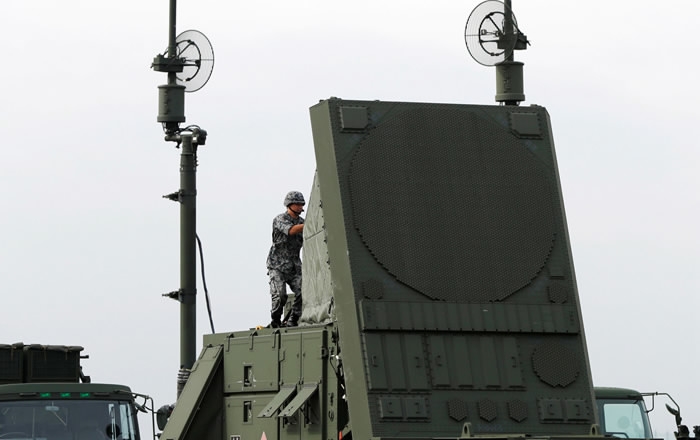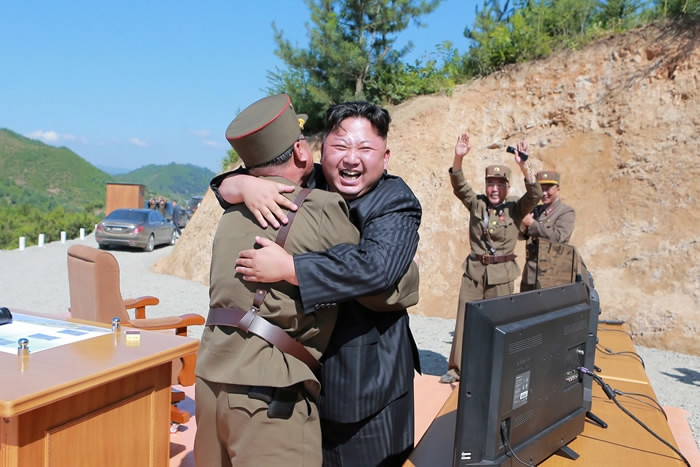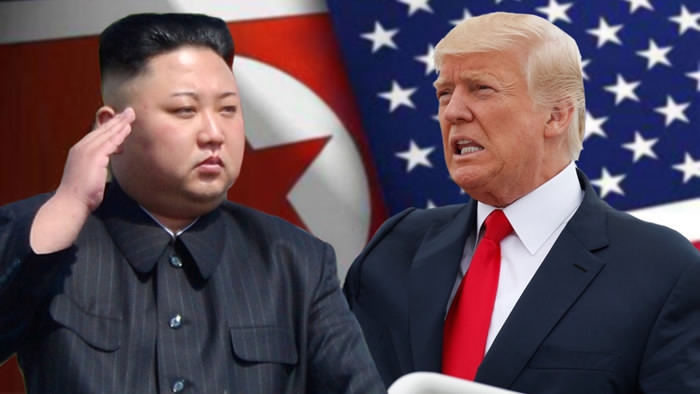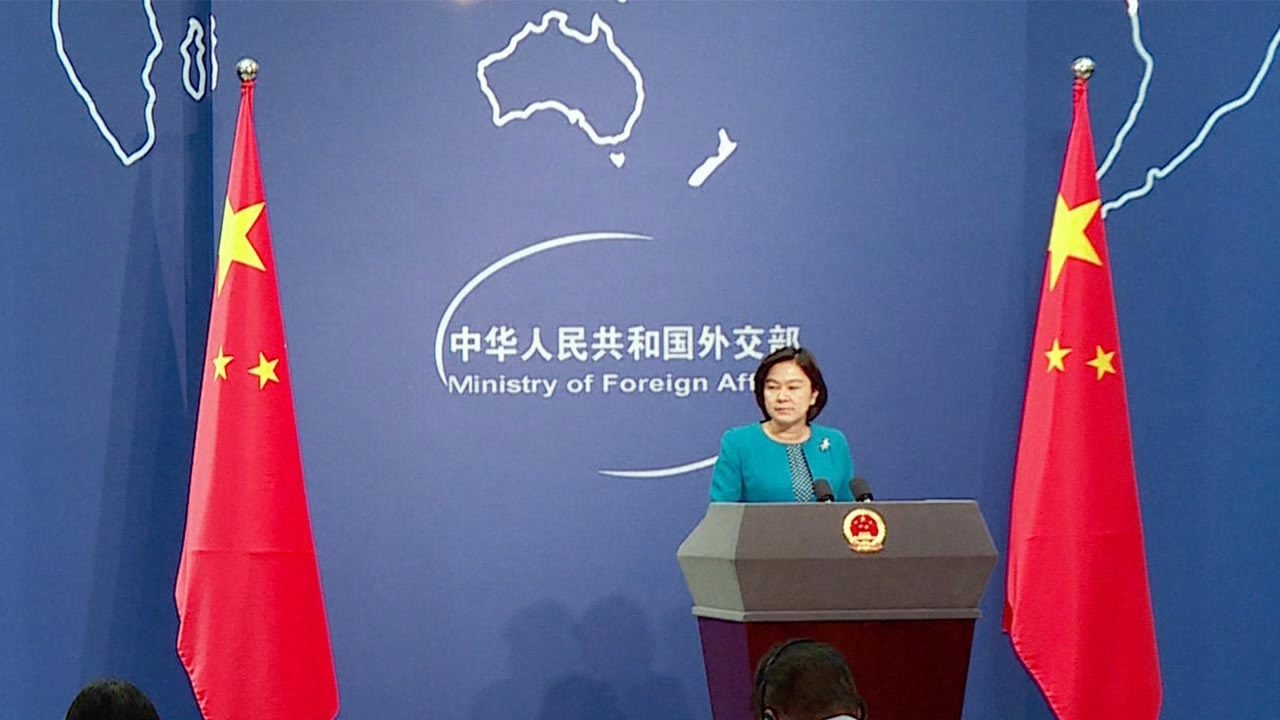The DPRK fired a ballistic missile over Japan's northern Hokkaido island into the sea on Tuesday, prompting a warning from US President Donald Trump that "all options are on the table" as the United States considers its response.
The test came as US and South Korean forces conduct their joint annual military exercises on the Korean peninsula, angering the DPRK which sees them as a preparation for invasion.
The DPRK missile, which was fired from an area near the capital Pyongyang, passed over the Japanese territory and landed in the Pacific Ocean, after a flight of about 2,500 km. It was lofted as high as 550 km.
According to South Korean media reports, South Korea's military saw the missile as DPRK's newly developed Hwasong-12 intermediate-range ballistic missile, which Pyongyang said in May had been successfully test-fired.

A Japan Self-Defense Forces soldier takes part in a drill to mobilize their Patriot Advanced Capability-3 (PAC-3) missile unit in response to a recent missile launch by the DPRK, at US Air Force Yokota Air Base in Fussa on the outskirts of Tokyo, Japan, August 29, 2017. /Reuters Photo
A Japan Self-Defense Forces soldier takes part in a drill to mobilize their Patriot Advanced Capability-3 (PAC-3) missile unit in response to a recent missile launch by the DPRK, at US Air Force Yokota Air Base in Fussa on the outskirts of Tokyo, Japan, August 29, 2017. /Reuters Photo
Washington, Tokyo, Seoul denounce Pyongyang's 'provocation'
The DPRK has conducted dozens of ballistic missile tests under its leader Kim Jong Un, the most recent on Saturday, but firing projectiles over mainland Japan is rare.
Trump said the world had received DPRK's latest message "loud and clear."
Pyongyang "has signaled its contempt for its neighbors, for all members of the United Nations, and for minimum standards of acceptable international behavior," Trump said in a statement released by the White House.
He added "threatening and destabilizing actions" only increase Pyongyang's isolation "in the region and among all nations of the world," stressing that "all options are on the table."
Trump spoke with Japanese Prime Minister Shinzo Abe over the phone and the two agreed that the DPRK "poses a grave and growing direct threat to the United States, Japan, and the Republic of Korea (ROK), as well as to countries around the world", the White House said.

DPRK leader Kim Jong Un (L2) celebrates with scientists and technicians of the DPRK Academy of Defence Science after the test-launch of the intercontinental ballistic missile Hwasong-14 in this undated photo released by the Korean Central News Agency (KCNA) in Pyongyang, July 5, 2017.
DPRK leader Kim Jong Un (L2) celebrates with scientists and technicians of the DPRK Academy of Defence Science after the test-launch of the intercontinental ballistic missile Hwasong-14 in this undated photo released by the Korean Central News Agency (KCNA) in Pyongyang, July 5, 2017.
South Korea's Foreign Ministry said in a statement that the government strongly denounces DPRK's another "provocation" in defiance of the international community's grave message through a new UN Security Council resolution.
Earlier this month, the UN Security Council unanimously adopted a resolution toughening sanctions on the DPRK following Pyongyang's tests in July of what it called two intercontinental ballistic missiles.
Beijing blames both sides for escalating tensions
At a regular press briefing on Tuesday, Chinese Foreign Ministry spokeswoman Hua Chunying indicated that both sides – the US and South Korea on the one hand and the DPRK on the other – were responsible for the escalation of tensions.
The root cause of the nuclear crisis on the Korean Peninsula is security issues and conflicts between the DPRK and the US and between the DPRK and the ROK, Hua said.
The parties directly involved in the crisis must "address each other's legitimate and reasonable security concerns" through peaceful dialogue, she stressed, calling it the only way to resolve the problem "once and for all."
While China urges restraint, calmness and dialogue among all the parties, one side directly involved "keeps conducting military drills" and "keeps imposing and intensifying military pressure"; in the meantime, "the other side keeps flexing muscles by launching missiles," she told reporters, suggesting that both sides should take the blame and make more efforts to defuse tensions.
Hua reiterated China's "dual suspension" proposal, which calls for a halt of both the US-ROK drills and DPRK's missile tests.
The situation is "now at a tipping point approaching a crisis. At the same time there is an opportunity to reopen peace talks," she said.
UN Security Council resolutions on the issue did not only put the emphasis on measures to stop DPRK's nuclear and missile program, but also called for the resumption of the Six-Party talks, she noted, urging all relevant parties to enforce the resolutions in a comprehensive and balanced way.
Source(s): Reuters





